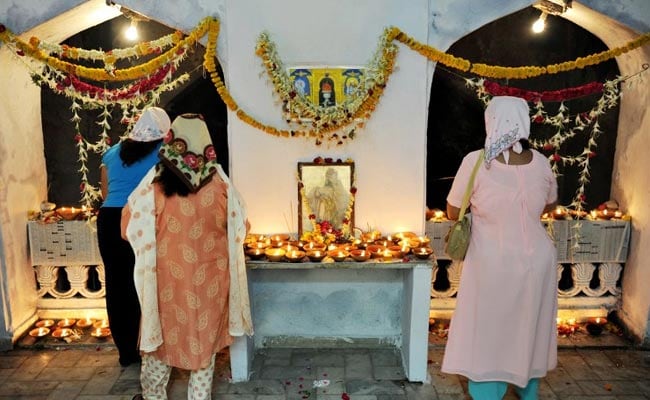
Parsi women who marry non-Parsis were not allowed into fire temples earlier (Representational)
Pune:
Over 100 "reformist" Parsis have inaugurated a fire temple in Pune's Kondhwa area which recognises the children of Parsis marrying outside the community as well as allows entry to non-Parsis.
The shrine made on a budget of Rs 2.2 crore is an attempt to end the discrimination meted out to non-Parsi spouses in the community.
Top lawyer Fali Nariman, former advocate general Darius Khambata and industrialist Anu Aga are some of the donors of the temple under the banner of 'Association for Revival of Zoroastrianism'.
The inauguration ceremony saw the participation of over 100 Parsis and their non-Parsi spouses and children. Some couples also flew in from abroad.
"We have a gender discrimination issue due to which if any Parsi woman gets married to a non-Parsi, she is not allowed to enter the sacred fire temple. Even their children are not allowed inside the temple," said Vispy Wadia, a reformist.
"When a Parsi man marries outside the community, his children are allowed inside the fire temple, but the spouse is not allowed. When they visit a fire temple, the non-Parsi spouse is made to wait outside the temple," he said.
Terming this tradition as "pure discrimination", Mr Wadia said it has a big psychological impact on children when they see that their mother cannot enter the temple.
"To end this gender discrimination, we thought we should have our own place of worship, where there is no gender discrimination or any other constraints," he said.
Mr Wadia, married within the community, said several like-minded people thought the orthodoxy was wrong and regressive.
"We thought we need to have a separate place of worship, where anybody can come in with their heads held high, without any fear, prejudice and discrimination," he asserted.
The Association for Revival of Zoroastrianism has received support from several people, from within and outside the community, for the initiative, he said.
Orthodox rules are dividing the Parsi families, Mr Wadia argued.
"We (reformists) are uniting families. Among Parsis, around 35 per cent marriages take place outside the community and the number increases every year," he said.
The shrine made on a budget of Rs 2.2 crore is an attempt to end the discrimination meted out to non-Parsi spouses in the community.
Top lawyer Fali Nariman, former advocate general Darius Khambata and industrialist Anu Aga are some of the donors of the temple under the banner of 'Association for Revival of Zoroastrianism'.
The inauguration ceremony saw the participation of over 100 Parsis and their non-Parsi spouses and children. Some couples also flew in from abroad.
"We have a gender discrimination issue due to which if any Parsi woman gets married to a non-Parsi, she is not allowed to enter the sacred fire temple. Even their children are not allowed inside the temple," said Vispy Wadia, a reformist.
"When a Parsi man marries outside the community, his children are allowed inside the fire temple, but the spouse is not allowed. When they visit a fire temple, the non-Parsi spouse is made to wait outside the temple," he said.
Terming this tradition as "pure discrimination", Mr Wadia said it has a big psychological impact on children when they see that their mother cannot enter the temple.
"To end this gender discrimination, we thought we should have our own place of worship, where there is no gender discrimination or any other constraints," he said.
Mr Wadia, married within the community, said several like-minded people thought the orthodoxy was wrong and regressive.
"We thought we need to have a separate place of worship, where anybody can come in with their heads held high, without any fear, prejudice and discrimination," he asserted.
The Association for Revival of Zoroastrianism has received support from several people, from within and outside the community, for the initiative, he said.
Orthodox rules are dividing the Parsi families, Mr Wadia argued.
"We (reformists) are uniting families. Among Parsis, around 35 per cent marriages take place outside the community and the number increases every year," he said.
Track Latest News Live on NDTV.com and get news updates from India and around the world

